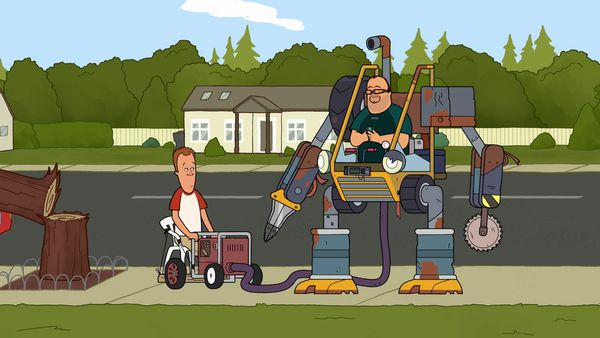
As an artist who brings complex stories to life through theater, I understand the power of storytelling to shape how we see the world — and what we believe is possible. Narratives can inspire hope, spark change or, as in the case of Fox’s new animated series "Universal Basic Guys" (now streaming on Hulu) reduce transformative ideas to shallow stereotypes.
Some 64% of Americans live paycheck to paycheck – and the majority of families are one unexpected expense away from crisis. Yet in its portrayal of universal basic income, "Universal Basic Guys" turns a lifeline into a punchline. The show follows brothers Mark and Hank Hoagies (voiced by series creators Adam and Craig Malamut), who were "not well-off" even at their factory jobs, and now receive a monthly stipend comparable to those wages after losing their jobs to automation. Yet remarkably, universal basic income isn't mentioned once in the dialogue of the opening episode. The only explanation of the policy comes from a blink-and-you-miss-it description in the opening theme song: “I used to work in a hot dog factory until the robots came along. And now there is no job for me but I get $3,000 a month thanks to basic income. Now we’re Universal Basic Guys. It’s still not much, but we’re still going to try.”
The show squanders its premise by defaulting to the oldest stereotype in the book – that people would rather coast on government support than achieve stability through meaningful work. It goes on to reduce the brothers to caricatures making one bad decision after another – from blowing their guaranteed income on everything from a luxury cruise to an elite country club to an exotic pet. And when they do attempt professional growth, it's played for cheap laughs. Take their foray into advertising through entry-level internships: Mark gets fired for drinking on the job while Hank rejects a promotion because weekend work might interfere with watching the NFL draft. Instead of these tired sitcom storylines, imagine showing how basic income could help former factory workers navigate career transitions, finding humor in their authentic struggles with professional growth.
The show’s depiction of basic income couldn’t be further from the truth. Rather than participants luxuriating in newfound free time, a Stockton, California pilot found that full-time employment actually rose among those receiving guaranteed income, while their financial, physical and emotional health also improved. There’s little room for frivolous spending, either: in Minnesota’s Guaranteed Income for Artists pilot program, people allocate their funds primarily to essentials, with 35.94% directed toward critical retail purchases, followed by food (30.26%) and housing (10%). Many basic income programs are also designed specifically to support individuals working low-wage jobs or cobbling together income from gig work — and they’re part of a growing movement. With over 100 pilot programs across the United States, these initiatives are showing how financial stability enables people to invest in their futures.
To better understand the reality of basic income, the showrunners would be well-served to speak with an actual recipient of UBI – like Torri Hanna, a fiber artist in the Minnesota program. Her monthly $500 stipend helped stabilize her yarn store and improve her housing situation with her daughter. She now creates art for downtown storefronts with the senior center, showing how basic income ripples through communities – an impact completely missing from Fox's cartoonish portrayal.
The stakes of such misrepresentation extend far beyond bad television. As artist and organizer Ricardo Levins Morales explains, "The soil is more important than the seeds," – a profound insight into cultural change. Just as plants struggle to grow in toxic environments, transformative ideas like basic income can't flourish in a culture poisoned by narratives that people can't be trusted with economic freedom. Television has proven it can cultivate better ground for change. "Good Times" brought public housing realities to millions in the 1970s, addressing safety nets with nuance. "Superstore" used workplace comedy to illuminate low-wage workers' struggles. Even Fox's own animated shows excel at social commentary – "The Simpsons" roasts political hypocrisy while "Bob's Burgers" exposes the struggles of running a small business. "Universal Basic Guys" doesn’t need to be a dry economics lecture, but entertainment can be both funny and nourishing to our shared cultural landscape.

What if "Universal Basic Guys" told a better story — that basic income unlocks purpose in two men labeled as slackers, trapped by systemic barriers and dead-end jobs? Instead of burying the concept in a throwaway theme song, the show could weave honest dialogue about this new social contract throughout its episodes, replacing silence with understanding. Their transformation could challenge assumptions about human potential and growth, especially now, as some states move to ban guaranteed income programs. Shows like this shape public perception and policy, making it vital to highlight how basic income fosters the economic freedom everyone needs to thrive.
To reach its potential, Universal Basic Guys must evolve beyond parody into a narrative that reflects the real power of guaranteed income. With a second season already greenlit, it has a real opportunity to pivot and tell a story of struggle, resilience and growth, honoring the dignity and potential of those often overlooked. By portraying how basic income helps people rebuild their lives, the show could drive social change, proving that economic freedom is key to unlocking human potential.
The stakes are high. Media influences policies and how we see each other. A nuanced, compassionate take on basic income could pave the way for a future where economic security is a right — not a punchline.







